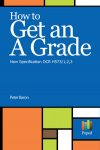Specification H573/3 Gender and Theology
January 9, 2018
 Here is the OCR specification with hyperlinks applied to make it easy for you to resource the suggested reading. Scroll down and you will find my comments designed to help you understand the key issues in this part of the specification, and how they relate to other two papers, or other parts of Christian Thought. If you wish to understand fully how the specification hangs together, then try my new book – How to Get an A Grade, where I analyse the specification in microscopic detail….available in the peped shop with our new study guides for each paper. Finally, if you need a tutor, we now have tutors available at a fair hourly rate. Just email me for details, peterbaron@peped.org
Here is the OCR specification with hyperlinks applied to make it easy for you to resource the suggested reading. Scroll down and you will find my comments designed to help you understand the key issues in this part of the specification, and how they relate to other two papers, or other parts of Christian Thought. If you wish to understand fully how the specification hangs together, then try my new book – How to Get an A Grade, where I analyse the specification in microscopic detail….available in the peped shop with our new study guides for each paper. Finally, if you need a tutor, we now have tutors available at a fair hourly rate. Just email me for details, peterbaron@peped.org
5. Society: Gender and Theology
The relationship between religion and society, including issues such as how religions adapt when encountering different cultures; religious tolerance, respect and recognition and views of other religions and non-religious worldviews; religion, equality and discrimination; the political and social influence of religious institutions.
5.1 Content
• The reinterpretation of God by feminist theologians, including:
– the teaching of Rosemary Radford Ruether and Mary Daly on gender and its implications for the Christian idea of God
5.2 Knowledge
• Ruether’s discussion of the maleness of Christ and its implications for salvation including:
– Jesus’ challenge to the male warrior-messiah expectation
– God as the female wisdom principle
– Jesus as the incarnation of wisdom
• Daly’s claim that ‘if God is male then the male is God’ and its implications for Christianity, including:
– Christianity’s ‘Unholy Trinity’ of rape, genocide and war
– spirituality experienced through nature
5.3 Issues as the basis of exam questions
Learners should have the opportunity to discuss issues related to God, gender and feminist
theology, including:
• a comparison of Ruether’s and Daly’s feminist theologies:
– sexism and patriarchy in Christianity, as it has developed in the mainstream Churches
– whether Christianity can be changed or should be abandoned
• whether or not Christianity is essentially sexist
• whether or not a male saviour can save women
• whether or not only women can develop a genuine spirituality
• whether or not the Christian God can be presented in female terms
5.4 Suggested scholarly views, academic approaches and sources of wisdom and authority
For reference, the ideas of Radford Ruether and Daly listed above can be found in:
• Radford Ruether, R. Sexism and God-Talk, Chapter 9
• Daly, M. Beyond God the Father, Chapter 4
Learners will be given credit for referring to any appropriate scholarly views, academic
approaches and sources of wisdom and authority, however the following examples may prove useful:
• Phyllis Trible, P. (1984) Texts of Terror, Fortress Press, Introduction and Chapter 2
• Wilcockson, M. (2010) Social Ethics, Hodder Education, Chapter 2
• Luke 24:9–12
• Acts 16:13–15
Further Reading:
For an excellent online discussion of all the issues surrounding Mary Daly‘s radical feminism, go to a PHD thesis by Johanna Wood (added by PB – scroll down to the relevant sections)
PATRIARCHY, FEMINISM AND MARY DALY: A SYSTEMATIC-THEOLOGICAL ENQUIRY INTO DALY’S ENGAGEMENT WITH GENDER ISSUES IN CHRISTIAN THEOLOGY
http://uir.unisa.ac.za/bitstream/handle/10500/8820/thesis_wood_jm.pdf






0 Comments